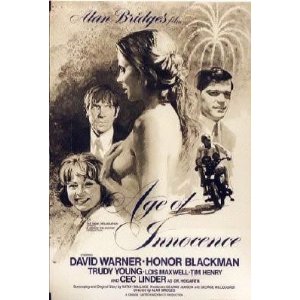
AGE OF INNOCENCE
Canada/UK, 1977, 101 minutes, Colour.
David Warner, Honor Blackman, Trudy Young, Cec Linder, Tim Henry, Robert Hawkins, Joey Davidson, Lois Maxwell.
Directed by Alan Bridges.
Age of Innocence is one of several Canadian/British co-productions of the late '70s. The atmosphere and story are Canadian as is the supporting cast. However, stars and director are British. The atmosphere of Canada is communicated but is not entirely persuasive. David Warner is good in the central role, performing a difficulty written role. Honor Blackman indulges herself with an 'all stops out' performance.
Direction is by Alan Bridges who made the very interesting The Hireling as well as the remake of Brief Encounter and the claustrophobic Out Of Season. Quite a lot of issues are raised since the setting is the post World War One period. There is a look at pacifism, the new permissive sexual morality, the small isolated society. However, the themes are not so much explored as dramatised, even to melodrama.
1. The meaning of the title, its focus on particular characters and themes? Memories of past ? realistically or romantically remembered?
2. The British contribution to the film: direction, actors? The Canadian production, locations, cast? The history of Canada, relationship with England, World War One, independence? Canadian issues, society, culture? The use of locations? Music?
3. Audience identification with Henry? His strength of character, a mysterious presence in the town, British background, his skill at teaching though seeming unorthodox? His impact on the children? Sam's hero-worship? His passion for bikes, radio? The children's curiosity, especially that of Sam? His relationship with Mr. Carter and his hostility because of Sam? The Machinations of the board and the hesitation about Henry? His disturbing the people with his pacifist speech in the chapel? Mrs. Boswell and her flirting with him, the outings? The bike ride? The contrast with Clarissa, the encounter, the swim, the lyrical bike ride? Her falling in love with him? His staying temporarily at the school? The summer and the absence of students? Ralph and Lloyd and their hostility towards Henry? Creating scenes? The impact of Clarissa coming to him and staying the night, Sam seeing this, the alibi for Mrs. Boswell's death? The framing of Henry by Dr. Hogarth and Mr. Carter? Clarissa's speaking the truth? Henry asking Sam not to speak out? Ralph and Lloyd's hostility from the dance, to the death of Mrs. Boswell and their fear? Police interrogations? The letter Sam sent to his father, the background of pacifism in the war, military issues? The uncertainty of Henry's future? Would Clarissa cone to him? A complex character, how well delineated? The strength of the situations, dialogue? Melodrama?
4. The atmosphere of the small Canadian town: the ordinary town with which people could identify, the school and the students, the various functions, the chapel, Mrs. Boswell and her reputation for men, Clarissa and her distaste for the town and wanting to leave, horses and bikes, work, prospects for the young men in the town, drinking, dances, fights and scandals, patriotism and jingoism, the xenophobia of the people? The cover up of the killing? How was this town meant to be a microcosm of Canada?
5. Sam and his enthusiasm for learning, radio, admiration for Henry, Henry's affirmation of him and his being able to stand up to his father? The taking of the letter and the irony of its not helping Henry? His wanting to help? The swims, the secrets? His not telling at the end? How would Henry have affected Sam's life for the future? As counteracting the influence of his father?
6. The portrait of Mrs Boswell, how much was revealed by her infatuated dancing semi-nude before her mirror, her playing the organ in the church, drinking, riding on the bike, the party? The ugliness and irony of her death?
7. The contrast with Clarissa, her place in the school, her going away to study, her father? The church and the board? Dr. Hogarth in league with Mr Carter? Clarissa’s return, watching Henry swim, Ralph and his jealousy? The discussions about life in the town and her needing to move away? Her very modern approach e.g. quoting Marie Stopes about birth control? Racing the horse? Visiting Henry's room and feeling rejected? The dance and her going to Henry at night? The authenticity of their love? Telling the truth? Her plans to come to Henry in the future? Would she?
8. Ralph and Lloyd, a sketching of young men about the town, lack of ambition, tied to the town, jealousy of Henry? The ugliness of the killing of Mrs. Boswell and their willingness to cover up?
9. How pessimistic a portrait of people? Issues? The good and the evil in people? Issues of war, society. the modernisation of Canada? Morals, double standards? How universal the themes?